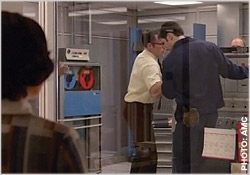
Called “Monolith,” this was one heavy-handed, overwrought episode, written by Erin Levy. Heavy on M's (the moon, Mona, Mona Lisa, The Mets) big lunar symbolism, and the
show’s official theme -- death -- it offered as much of a meta-commentary on “Mad Men” itself as a new storyline. As Lloyd the unlikely tech explorer tells Don, "It's been my
experience these machines can be a metaphor for whatever's on people's minds."
Given all the tension in the office surrounding the coming of the IBM 360, you’d think it was The Bomb. I mean
the Big One. As in worries about the Cold War. Duck and cover, Sterling Cooper!
Really, why would anyone wear a hard hat to announce the installation of a room-sized computer behind glass
walls? What would be falling on their heads? And isn’t everything metal? (Like the Iron Curtain?)
advertisement
advertisement
And what’s with the hammering? All the banging was more like a theatrical
flourish, like the constant dirge of “Flores para los muertos” (flowers for the dead) during “A Street Car Named Desire.” Were they building a wooden coffin?
Don
comes into an empty office, as if everyone had suddenly vaporized, save for the single piece of evidence that there’d been life on this planet: a desk phone with its receiver dangling off the
hook, the cord suggesting a hangman’s noose.
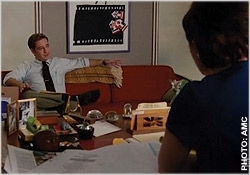 It struck me that all of the talk of technology killing creativity was about 30 years ahead of its time in
the ad industry. After all, 1969 was still a pivotal moment for small creative shops to get started and make their marks.
It struck me that all of the talk of technology killing creativity was about 30 years ahead of its time in
the ad industry. After all, 1969 was still a pivotal moment for small creative shops to get started and make their marks.
Sadly, the eclipse (the dark side of the moon?) is happening now.
Media companies are the new Leviathans. Most of the remaining smaller agencies known for great creative have long been gobbled up by giant monoliths of global holding companies that have to make their
quarterly numbers. At this point, most of the profits are coming from creative accounting, not the actual client messaging. Shades of Lane Pryce!
Starting with the Monolith, the obvious
allusions were to the murderous HAL-9000 in "2001: A Space Odyssey.” But there were also references to Apple, the company that saw IBM as its biggest threat and set out to destroy it.
Apple’s most famous commercial, “1984,” shows a blonde runner throwing a sledgehammer at “Big Brother” on an enormous screen. Big Brother was meant to suggest “Big
Blue.” “We shall prevail” is the last thing Big Bro says.
While the other creatives were raging against the machine, Stan, the bearded, love-beaded art director, called it a
piece of art, “The Mona Lisa.” “People will be lining up to see it in the Louvre,” he said. Apple established the whole design superiority issue for otherwise ugly
machines, and indeed, The Lisa (one of Apple’s first computers, named for Steve Jobs’ daughter) is now a museum piece.
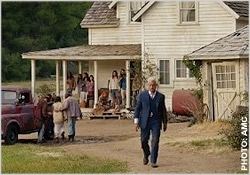 On to another M: I loved having Mona back. Played by Talia Balsam, she was actually the first Mrs. Clooney, and is married to Roger (John Slattery) in real life. The writing and acting in the car
scene, en route to Kingston to rescue Margaret from the dirty, venereal-diseased hippies, was flat-out marvelous.
On to another M: I loved having Mona back. Played by Talia Balsam, she was actually the first Mrs. Clooney, and is married to Roger (John Slattery) in real life. The writing and acting in the car
scene, en route to Kingston to rescue Margaret from the dirty, venereal-diseased hippies, was flat-out marvelous.
In this episode, it seems everyone is Don and Betty except for Don and Betty.
Mona wears a completely inappropriate outfit (a fur jacket) for visiting the farm, as Betty did in her school trip last week. In the opening scene, Pete’s new real estate agent/girlfriend looked
and sounded exactly like Betty. And the breakdown in the mud between Margaret and her father perfectly paralleled the story of what Don has selfishly wrought on his own daughter, Sally.
Lou
shows up to a meeting in a sharp suit, which made him seem more Don-like. Freddy is impersonating Don around town, selling his work. And Peggy is running the new pitch for Burger Chef, which should be
Don’s role.
Back to the commune: Margaret was always an annoyingly underwritten character, more a stereotype than a fleshed-out person. But would she actually go from wearing hats for
brunch at the Plaza with Daddy to a commune within months? To freeze, churn butter, and rut with a greasy-haired, moneyless stoner of a boyfriend named Clay? (As in feet of.) It would be much more
likely for someone of her moneyed, spoiled, young-deb background to run away to California to the Dennis Hopper crowd (he was taking a child bride at the time), where her style would be more silk head
scarves and Pucci patio pants. Or, like Prudence (Mia Farrow’s sister) and The Beatles in 1968, she could escape to an ashram in India.
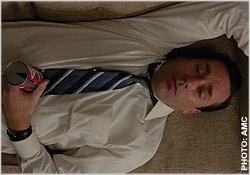
Running away, and flouting the rules, was another major theme, as manifested by Don as he hid in his coffin, er, office. It’s the office of a dead man (as Bert made overly clear), with Don
still bearing a dead man’s name, and a career that’s dead in the water.
But another symbol of death becomes a possible flicker of life: Don finds the Mets pennant in Lane's office.
At first, he pitches it, but then later hangs it up (he seems to smile, remembering Lane’s adopted team). Of course the underdog Mets won the World Series in 1969 and were known as "The Amazing
Mets," and "The Miracle Mets." (MM.)
Also, you have to hand it Don for being an autodidact, who tackles the smart books -- why he was reading Philip Roth’s “Portnoy’s
Complaint,” published in 1969. Is it a sign that Don’s life is becoming more Rothian and less Cheeveresque? The book is based on a therapy session between protagonist Portnoy and his
analyst -- and various couches are seen throughout the episode, a metaphor not only for psychoanalysis, but creativity and self-awareness (and, for Ginsburg, farts).
Don spends a lot of time
on his office couch, drying out, hallucinating, and who knows what else. (He is also shown playing solitaire -- with cards, not Portnoy-style.)
Losing his sofa is too much for Ginsburg, who enlists Don to help him carry it, also letting Don know that he
needs to pull his weight, which Don emphatically does not.
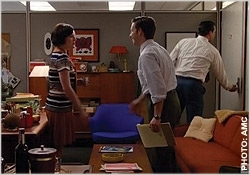 Don is stamping his feet like a child after a humiliating couch-sit in Peggy’s office, being treated
like the fetus copywriter sitting next to him. Don refuses to do his tagline assignment. (That's a terrible way to create an ad -- as Don points out, first you have to figure out the strategy.)
Don is stamping his feet like a child after a humiliating couch-sit in Peggy’s office, being treated
like the fetus copywriter sitting next to him. Don refuses to do his tagline assignment. (That's a terrible way to create an ad -- as Don points out, first you have to figure out the strategy.)
He jeopardizes his job, and any payout, by disobeying the rules about booze and filching a bottle from Roger. I don’t think any of us could watch Don go down that hole again.
I
actually wondered whether Ms. Neve Campbell might be on the other end of his invitation to the Mets game. Thankfully, it was Freddy, his only friend, who saves him, like an AA sponsor. (Get it?)
Freddy tells Don to do the work.
One last design note: What happened to Roger’s stark, hospital-white Clockwork Orangey-office? It’s now brownish and hideous. Pretty much
everything about the ‘70s design was ugly: the earth tones, wallpaper, the macramé, the polyester. It’s an assault on the eyes for all who loved the starched rigidity, natural
fibers, and major undergarments of the early ‘60s. I see no Banana Republic lines sprouting from the present costumes. Has the ugly clothing made the characters ugly?
I wonder if Don is
going to Think Different.